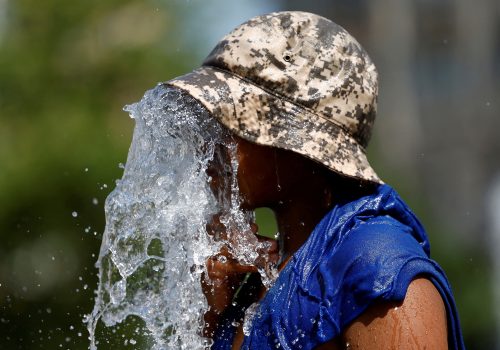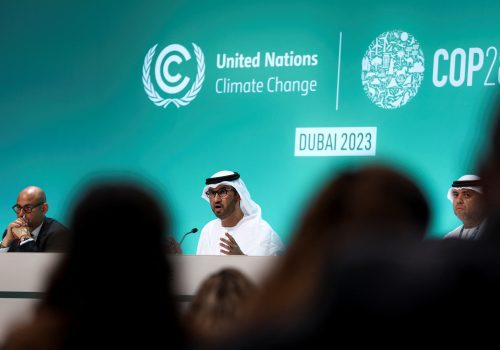“Extreme heat has to be viewed as one of the most dangerous results of the changing climate,” said former US Secretary of State Hillary Clinton on Sunday at a COP28 Resilience Hub discussion on the need for gender-responsive climate solutions to address extreme heat. The panel was hosted by the Atlantic Council’s Adrienne Arsht-Rockefeller Foundation Resilience Center (Arsht-Rock).
Clinton was joined by Reema Nanavaty, director of the Self-Employed Women’s Association (SEWA), a trade union promoting the rights of independently employed female workers in India. In February, the Clinton Global Initiative and SEWA, along with several other organizations, launched the Global Climate Resilience Fund to empower women to combat climate change and adapt to extreme heat. The panel was moderated by Eleni Myrivili, the global chief heat officer for United Nations-Habitat and Arsht-Rock.
Clinton said that as the world works to advance climate mitigation efforts, “we have to worry about what’s happening on the ground with so many people, in particular women.”
Below are more highlights from this discussion on the importance of empowering women to develop innovations for extreme heat resilience.
The gendered impacts of extreme heat
- Clinton highlighted the impacts of extreme heat on female salt rakers in Rajasthan, India, who are among the many workers whose livelihoods have been jeopardized by rising temperatures. “This is not just a health issue. It is an economic issue, a social issue, a political issue,” she said.
- “Women—and we know now because we’ve started to measure it—bear a much larger burden for this type of risk and this type of exposure” to extreme heat than men, said Myrivili.
- Speaking of women working in India’s informal sector, including small farmers, garment workers, and waste collectors, Nanavaty said they “not only face market shocks, but now repeated climate shocks.” Therefore, she said “their lives and livelihoods both are at stake.”
- “One has to have a bottom-up approach” to address the effects of extreme heat on these workers, Nanavaty explained, one that does not focus just on “adaptation and mitigation alone” but also builds resilience.
Obstacles and innovations
- “We’re going to have to re-envision urban planning to take into account extreme heat and climate shocks,” Clinton said, speaking of the need for more shading in public places and the construction of more solar panels.
- “We need to rethink the insurance industry,” Clinton added, explaining how insurance companies are pulling out of many places that are at heightened risk of climate disasters, particularly in the Global South.
- “We have to think about resilience systemically,” said Myrivili. She highlighted the importance of a systemic approach toward areas such as infrastructure and manufacturing to ensure adaptation does not fall short of the challenge.
- Nanavaty said that it was important to ensure that resilience is high on the political agenda. “We need to ask people in power: How would you build resilience against climate shocks?” she said.
A seat at the table
- Clinton said that efforts to empower women, including in climate policy, need to be seen in the context of a “quite visible pushback on women’s rights and opportunities” among many of the world’s governments. “We’re now sort of swimming against a tide that has turned against women in many parts of the world,” she said.
- To better address climate impacts affecting women, Clinton said, there need to be “more women at every level of decision making in the public, private, [and] not for profit sector.”
- Though 2023 is the hottest year on record, Myrivili said, “it’s probably going to be the coldest year of the rest of our lives. Think about that, and empower women,” she said.
- “Having access to clean air, clean water, and clean soil” are fundamental rights, said Nanavaty. “Having access to a healthier environment and climate is a fundamental right of every woman on this earth,” she said.
Daniel Hojnacki is an assistant editor on the editorial team at the Atlantic Council.
Watch the full event
Further reading
Fri, Jul 7, 2023
How four cities are building resilience to extreme heat
New Atlanticist By
Cities around the world are facing intense heat waves. But these four are taking proactive steps to prepare for and deal with extreme heat.
Thu, Jul 21, 2022
How to beat the extreme heat
Fast Thinking By
This is the reality of the changing climate—and it will only get worse from here. Our climate-resilience experts tell us how societies and individuals can adapt to this extreme heat.
Thu, Nov 30, 2023
COP28 is here. These are the Global South’s demands and expectations.
MENASource By Lama El Hatow
The COP28 negotiations will prove to be challenging given all the demands and expectations on the table in this COP.



